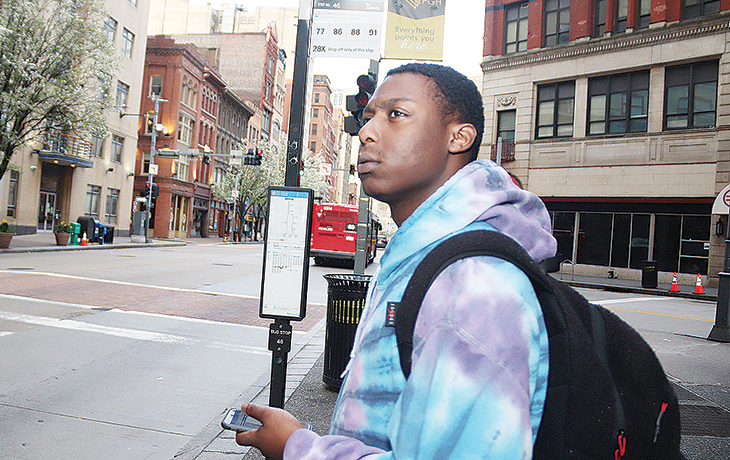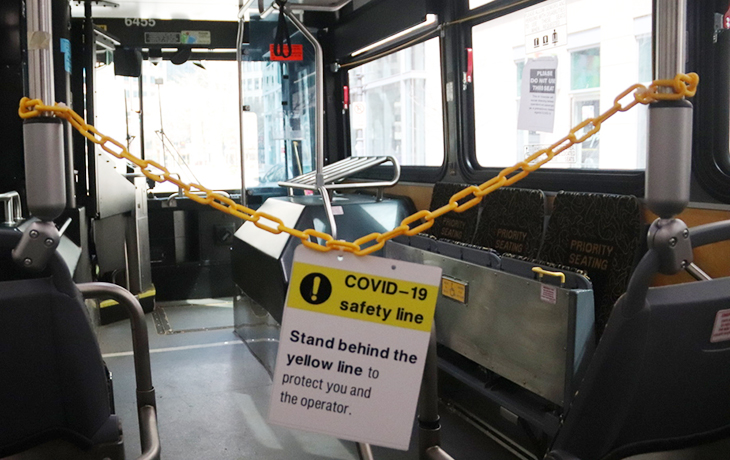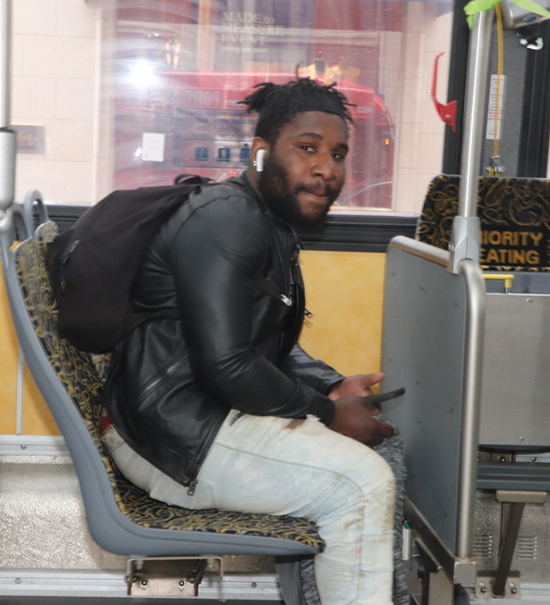by Rob Taylor Jr., Courier Staff Writer
Seventeen million.
That’s the number of people (and growing) across this country who have lost their jobs due to the coronavirus pandemic.
They’ve filed for unemployment, hoping to recoup some of the money they’ve lost.
Then there are the others, the “lucky ones,” said Lincoln-Lemington resident Preston Dennis, who at 22 years old, found out his job at DialAmerica was deemed “essential.”
He’s still working and getting a paycheck.
Here in the Pittsburgh area, like the rest of America, there are those, many of whom are African American, whose place of employment has set them up with a way to “work from home,” the new line that’s become the “cool” phrase these days. They’re able to get their tasks done, still report to their superiors virtually, stay home, stay safe, and keep the steady paycheck.

But what about the people who cannot “work from home”—the home health aides, the restaurant drive-thru workers, the gas station workers, the Giant Eagle and CVS workers? Oftentimes, these jobs, which are occupied by many African Americans in our area, are front-facing, meaning they interact regularly with the public. Sure, they may be wearing a mask and gloves, and many places have put up a plexiglass barrier between the employee and customer, but it’s still not guaranteed that the employee is safe from contracting novel coronavirus, or COVID-19.
The New Pittsburgh Courier’s J.L. Martello interviewed a number of Pittsburgh-area African Americans, all of whom admitted they’re thrilled to still be working, but know they’re out in the danger zone. Simply put, if they want to remain employed, they can’t stay home. It’s the chance they take to keep the lights on.
Dennis told the Courier that he felt “blessed” to still have his job in Greentree. “I’m just happy I’m still able to go ahead and make my money,” he said. Coronavirus “is setting a lot of people back in our city…everyone is losing their jobs and losing out on money, hurting a lot of people’s lives…I feel like one of the lucky ones because I didn’t know my job was essential,” Dennis said.
Pennsylvania Gov. Tom Wolf issued a “Stay-at-Home” order for the entire state last month, and non-life-sustaining businesses were ordered closed. That included everything from retail outlets, barber and beauty shops, nightclubs, fitness centers, movie theaters and most shopping malls. DialAmerica’s employees take calls concerning, among other things, health care inquiries, which, in part, has deemed the over-the-phone customer service company an “essential” business. In fact, the company recently posted an online callout for additional customer service representatives to join their company in Pittsburgh. “Essential and Hiring Now!!” the job post exclaims.
Dennis has to use public transportation to get to and from work, and while the Port Authority recently announced it would limit the number of people allowed on each bus to maintain social distancing, Dennis’ primary issue is how infrequently the buses run these days due to the pandemic.
“My bus comes once an hour now, instead of once every 20 minutes, so I don’t like catching the bus anymore, it’s irritating,” Dennis told the Courier. “It’s starting to mess with me getting to work on time.”
The Port Authority reduced the frequency of buses on certain routes due to low ridership.

Deneen Jones, a North Side resident and a home health aide, wants more frequent buses as well, but she also told the Courier of a greater concern. “I think the governor should mandate that everyone wears masks and gloves because there’s people walking around with coronavirus that don’t have symptoms,” she said. “It’s for everybody else’s safety.”
Jones, who’s still employed, also feels “grateful” and “blessed” to receive her normal paycheck. But having to ride the bus to get to and from work, along with being Downtown, puts her at a greater risk of being exposed to COVID-19. Worse, she has underlying health conditions—she’s a survivor of multiple brain surgeries.
“I have to work in order to live,” Jones told the Courier. “I do what I need to do to protect myself.”
The stories nationwide about front-facing workers, or those who work with others in close proximity, losing their lives to coronavirus are, unfortunately, numerous, especially those in the health care field, such as doctors and nurses.
But even away from the hospital, there was Annie Grant, a 55-year-old Black female, who worked for more than 15 years at a Tyson Foods meat plant in Georgia. She worked side-by-side with others at the meat plant, and on April 2, she died from complications of coronavirus.
Leilani Jordan, a Black female who was just 27 years old, worked at a grocery store in Maryland, where it’s believed she contracted coronavirus. She died on April 1.
Wando Evans, a 51-year-old Black male, worked at a Walmart in Illinois for 15 years. He fell ill on March 23 and died two days later from COVID-19. His family has since filed a wrongful death lawsuit against Walmart.

“For weeks, my brother and his co-workers worked at Walmart without masks or gloves while thousands of customers came in every day. There was no enforced social distancing at the time and inadequate paid leave to make sure people weren’t going to work sick,” said Evans’ sister, Angela McMiller, in a statement.
“The Centers for Disease Control (CDC) has designated Walmart stores as ‘high-volume retailers,’ making them responsible for taking additional precautions to protect employees and customers from the spread of COVID-19,” Tony Kalogerakos, the Evans’ family attorney, said in a statement.
“At a minimum, they were responsible for notifying store workers that a colleague had symptoms consistent with COVID-19, providing their employees personal protective equipment such as masks and latex gloves, implementing social distancing, and sending exposed employees home until cleared by medical professionals.”
A co-worker of Evans died from coronavirus a few days later.
Of the more than 20 deaths in Allegheny County due to coronavirus, there’s been no mention publicly on if any of the deaths were people who had been working a front-facing job.
Noah Posey works at GetGo in Wilkinsburg. He interacts with customers every time he’s on the clock. He’s happy he’s still working, but says, “our money is deserved right now,” given the risks.
Giant Eagle, which owns the GetGo stores, has announced at least five employees across the region who’ve tested positive for coronavirus.
For Wilkinsburg resident Kellee McFadden, she’s “happy to work, I still have an income, a lot of people don’t, but I’m nervous,” she said.
McFadden, a home health aide, travels from Wilkinsburg to Avalon and must take the PAT Bus to get there. “A lot of the time, coming home, you can’t social distance because the bus is too crowded. So I just keep my gloves, change my gloves on and off and keep my sanitizer, and that’s all I can do,” she told the Courier.
She’s happy for the bus drivers, that they still have an income. For at least three drivers, however, it was announced by the Port Authority that they had tested positive for coronavirus.
Keeping both the drivers and the public safe is the driving force behind the Port Authority’s recent action to limit passengers on its buses. No more than 10 riders will be permitted on a 35-foot bus at one time; 15 riders maximum on a 40-foot bus; and 25 riders maximum on a 60-foot articulated bus or light rail vehicle. The Port Authority said in a statement that drivers have been instructed not to pick up new passengers until others exit the bus.
“First and foremost, we’re asking riders who don’t have to be on our vehicles to stay home,” said Port Authority CEO Katharine Kelleman in an April 9 statement. “There are a lot of essential workers keeping our region going right now and it’s important that they have a seat. Please stay off transit unless you’re heading to or from an essential job, or you’re traveling to the grocery store or pharmacy.”
McFadden, who has no choice but to ride the bus to get to work, concurs. “People need to stay home,” she told the Courier. “I wish I could stay home and still have an income, but I don’t get that luxury. People feel like they’re suffering because they have to stay home, when all in all, it’s saving your life.”
(ABOUT THE TOP PHOTO: KELLEE MCFADDEN, of the North Side.)